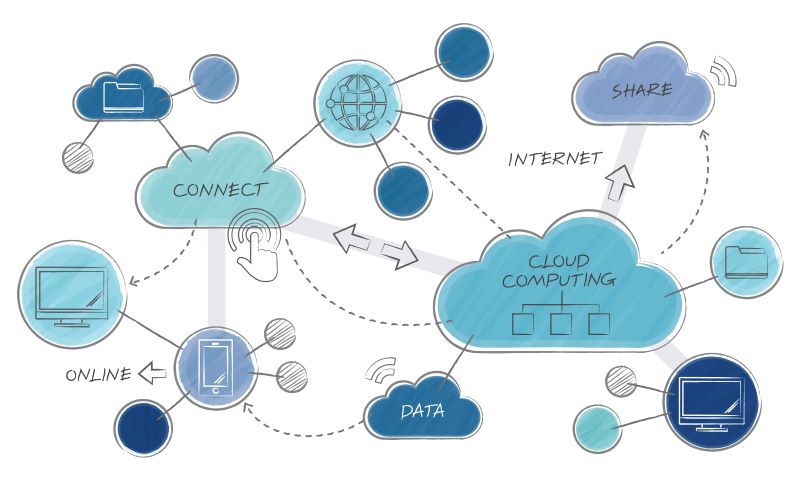In today’s rapidly evolving digital landscape, businesses are constantly seeking innovative ways to enhance efficiency, reduce costs, and deliver superior user experiences. One technology driving this transformation is cloud app development. By leveraging the power of the cloud, organizations can create scalable, flexible, and high-performance applications tailored to their unique needs. As more companies adopt cloud solutions, it’s clear that cloud app development is a key enabler of digital transformation, helping businesses to stay competitive and agile in a dynamic market.
Understanding Cloud App Development
Cloud app development refers to the process of building applications that run on cloud infrastructure, allowing users to access them over the internet. These applications do not rely on local servers or devices, but instead on cloud platforms such as AWS, Microsoft Azure, or Google Cloud. By hosting apps in the cloud, businesses benefit from increased storage, enhanced security, and reduced infrastructure costs.
There are several advantages to adopting cloud-based applications:
- Scalability: As businesses grow, cloud apps can easily scale to meet increasing demands without significant changes to the underlying infrastructure.
- Cost-effectiveness: Companies only pay for the resources they use, which reduces the need for large upfront investments in hardware and software.
- Remote Accessibility: Cloud apps can be accessed from anywhere, making them ideal for remote workforces and customers across the globe.
With cloud app development, organizations can streamline operations and improve user engagement, ensuring faster time-to-market for their digital products.
Key Components of Cloud App Development
To understand how cloud app development works, it’s essential to break down its core components:
- Cloud Infrastructure: This includes the servers, storage, and networking capabilities provided by cloud service providers. Popular platforms like AWS, Azure, and Google Cloud offer flexible infrastructure for developers to build, deploy, and manage applications.
- Platform as a Service (PaaS): PaaS solutions allow developers to focus on the application code without worrying about the underlying infrastructure. This accelerates the development process and enhances productivity.
- Microservices Architecture: Cloud apps are often built using microservices architecture, where different services operate independently but work together to form a complete application. This makes it easier to update, maintain, and scale individual parts of an app without affecting the entire system.
- Containers and Serverless Computing: Containers like Docker and Kubernetes help package applications and their dependencies, ensuring that they run consistently in different environments. Serverless computing takes this further by allowing developers to run applications without managing servers.
These elements form the foundation of cloud app development, enabling faster, more efficient, and scalable app creation.
Benefits of Cloud App Development for Businesses
The shift towards cloud app development is driven by several key benefits, making it an attractive option for businesses looking to future-proof their operations.
1. Reduced Time-to-Market
Cloud platforms provide pre-built development environments, allowing businesses to develop, test, and deploy applications much faster than traditional on-premise methods. This rapid development process enables companies to bring products to market quicker, staying ahead of competitors.
2. Cost Efficiency
One of the primary benefits of cloud app development is the pay-as-you-go model. Businesses only pay for the computing resources they need, avoiding the costs associated with maintaining physical servers. This financial flexibility is particularly valuable for startups and small businesses, which can invest more in innovation rather than infrastructure.
3. Flexibility and Scalability
Cloud-based applications are highly adaptable. As a business grows, so does its need for processing power and storage. With cloud infrastructure, scaling an app to accommodate increasing user demands is seamless. This scalability also extends to seasonal spikes in traffic, ensuring continuous availability and performance.
4. Enhanced Security
Contrary to common concerns, cloud app development offers robust security measures. Leading cloud providers implement high-level encryption, multi-factor authentication, and constant monitoring to safeguard data. For businesses dealing with sensitive information, this level of security is crucial for maintaining customer trust.
5. Improved Collaboration
Since cloud apps are accessible from any location with an internet connection, teams across different geographies can collaborate in real-time. This enables organizations to work more efficiently, break down silos, and foster innovation within distributed teams.
Challenges of Cloud App Development
While the benefits are significant, cloud app development does come with its challenges:
1. Vendor Lock-In
Switching from one cloud provider to another can be complex and costly. Businesses need to carefully evaluate their long-term cloud strategy to avoid vendor lock-in, which can limit flexibility and increase operational costs.
2. Compliance and Data Governance
Businesses operating in regulated industries need to ensure that their cloud apps comply with specific regulations (e.g., GDPR, HIPAA). This requires diligent data governance practices and ongoing compliance checks.
3. Downtime and Reliability
Although cloud providers typically offer high uptime, there is always the risk of downtime due to outages. Companies need to have a backup plan to ensure business continuity in the event of cloud service disruptions.
Future Trends in Cloud App Development
As cloud technology evolves, new trends are shaping the future of cloud app development:
1. Artificial Intelligence and Machine Learning Integration
AI and ML are becoming integral to cloud apps, providing businesses with deeper insights, automation, and personalization. These technologies will further enhance the capabilities of cloud apps, making them smarter and more responsive to user needs.
2. Hybrid Cloud Solutions
Many companies are adopting hybrid cloud models, combining public and private clouds to maximize flexibility and control. This approach allows businesses to keep sensitive data in private clouds while using public clouds for scalability.
3. Edge Computing
Edge computing, which processes data closer to its source (such as IoT devices), is emerging as a complement to cloud computing. As more devices generate vast amounts of data, edge computing will reduce latency and enhance the performance of cloud applications.
Cloud app development is poised to continue its rapid growth, with innovations like AI, hybrid clouds, and edge computing driving the next wave of transformation.
Conclusion:
Cloud app development is revolutionizing the way businesses create, deploy, and scale applications. By leveraging the power of the cloud, companies can achieve unprecedented flexibility, cost savings, and performance improvements. As more organizations adopt this technology, cloud app development will play an essential role in shaping the future of digital innovation.









